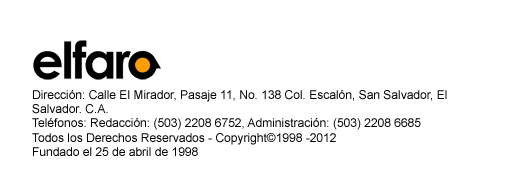SALVADORANS DISCUSS CRISTIANI CASE IN MADRID
Publicado el 6 de Junio de 2011
id: 183307
date: 12/16/2008 23:05
refid: 08SANSALVADOR1373
origin: Embassy San Salvador
classification: CONFIDENTIAL
destination:
header:
VZCZCXYZ0002
PP RUEHWEB
DE RUEHSN #1373 3512305
ZNY CCCCC ZZH
P 162305Z DEC 08
FM AMEMBASSY SAN SALVADOR
TO RUEHC/SECSTATE WASHDC PRIORITY 0463
INFO RUEHZA/WHA CENTRAL AMERICAN COLLECTIVE
RUEHMD/AMEMBASSY MADRID 3632
----------------- header ends ----------------
C O N F I D E N T I A L SAN SALVADOR 001373
SIPDIS
E.O. 12958: DECL: 12/15/2018
TAGS: PGOV, PREL, ES, SP
SUBJECT: SALVADORANS DISCUSS CRISTIANI CASE IN MADRID
Classified By: Robert I. Blau, CDA, for reasons 1.4 (b) and (d)
1. (C) Summary: Senior political figures from left and right
in El Salvador traveled to Madrid in early December to
discuss with the GOS the suit against former President
Cristiani regarding the 1989 murder of six Jesuit priests.
Deputy Prosecutor of the Spanish Audiencia Nacional Burgos
Pavon suggested to the Salvadorans the case would fail on its
merits since it had been tried in Salvadoran courts and did
not meet the threshold of genocide or a crime against
humanity. Other Spanish officials reportedly expressed
embarrassment at this and other similar cases. End Summary.
2. (U) According to media and other reports, U.S. and Spanish
human rights groups, with support of surviving relatives of
the victims, filed a lawsuit in Spanish court November 13
charging former El Salvador president Alfredo Cristiani
(1989-1994) with covering up crimes against humanity in the
1989 murder of six Jesuit priests. The suit also accuses 14
former Salvadoran military officers of war crimes, murders,
and state terrorism in connection with the same murders. Two
military officers were convicted of murder in 1991 in the
deaths of the Jesuits, but were pardoned in 1993 under El
Salvador,s Amnesty Law.
3. (C) At the request of El Salvador's post-war
ex-Presidents, former Minister of Justice and of Foreign
Affairs Oscar Santamaria and former (left-wing) FMLN
negotiator and peace accords signatory Salvador Samayoa
traveled to Madrid December 7-10 to meet with GOS officials
regarding the Cristiani case. Samayoa told PolCouns December
12 he and Santamaria met with Fernando Burgos Pavon, the
Deputy Prosecutor for the National Court (Audiencia
Nacional), who must prepare a report to the court on the
complaint. Samayoa said Burgos told them he viewed
assertions of so-called "universal jurisdiction" as without
merit, since the case had been tried in El Salvador. In
addition, the case did not qualify as a crime against
humanity or genocide, but was merely a common crime. Burgos
suggested two possible ways forward. First, delay, by making
inquiries via official (i.e., glacially slow) diplomatic
channels regarding handling of the case in El Salvador's
judicial system. Second, acceleration, where the GOES could
proactively submit information (instead of waiting for a
request from Madrid) on how the case was handled. Burgos
reportedly offered no preference between these options.
4. (C) Samayoa said it was clear the GOS, including Secretary
of State for Latin America Trinidad Jimenez at MFA, as well
as interlocutors at La Moncloa (the office of the Spanish
head of government) and at the Ministry of Justice, were
dealing with the GOES as "friends and partners". He said
they expressed embarrassment about this and other cases
before the Audiencia Nacional, including cases against
members of the current U.S. administration and "half" the
government in Beijing. Samayoa said the Salvadoran
Ambassador in Madrid had spoken to the Chief Prosecutor of
the Audiencia Nacional the previous week and had received a
similar message of support and cooperation. He said it had
been impossible to meet with former President Felipe Gonzalez
this trip.
5. (C) Comment: The murder of the Jesuits was an event of
pre-meditated cruelty that had the effect of accelerating
efforts to find a peaceful solution to the Civil War.
Cristiani was part of that search for a solution and had been
dealing personally with some of the Jesuits. Across the
political spectrum, our interlocutors have expressed dismay
at the charges against Cristiani, almost universally
rejecting outside interference in reopening cases from El
Salvador's civil war that were dealt with by the peace
commission and covered by El Salvador's Amnesty Law. It
seems unlikely this case in Spain will become an issue in
2009 elections.
BLAU
=======================CABLE ENDS============================




